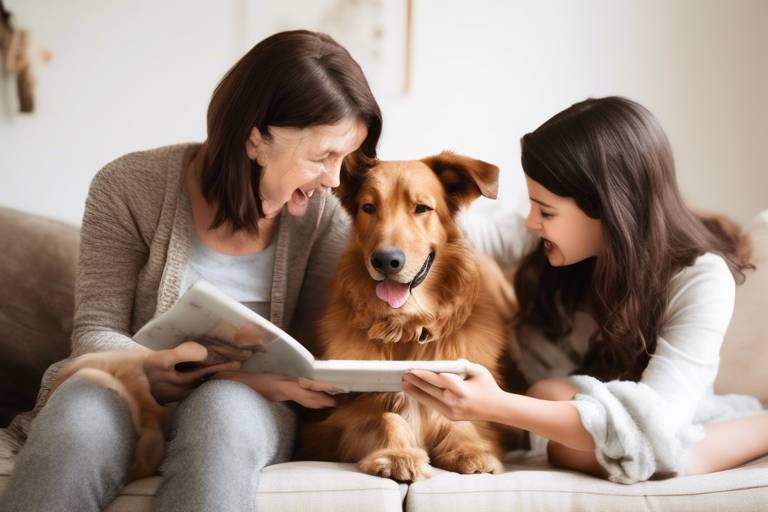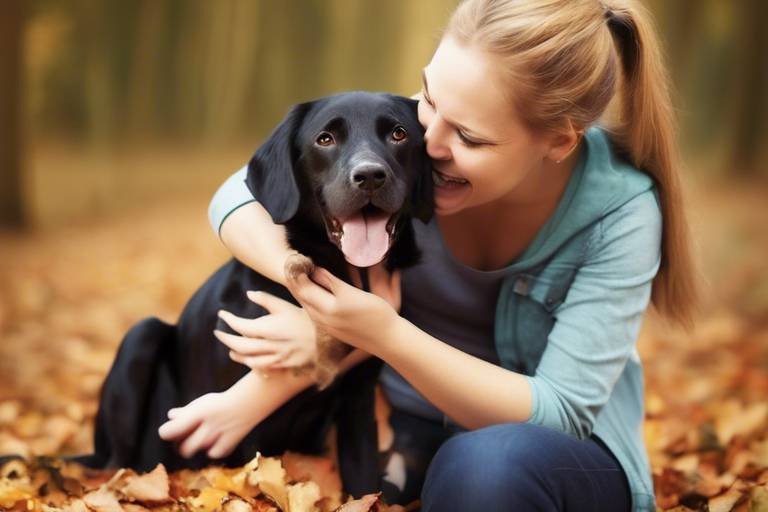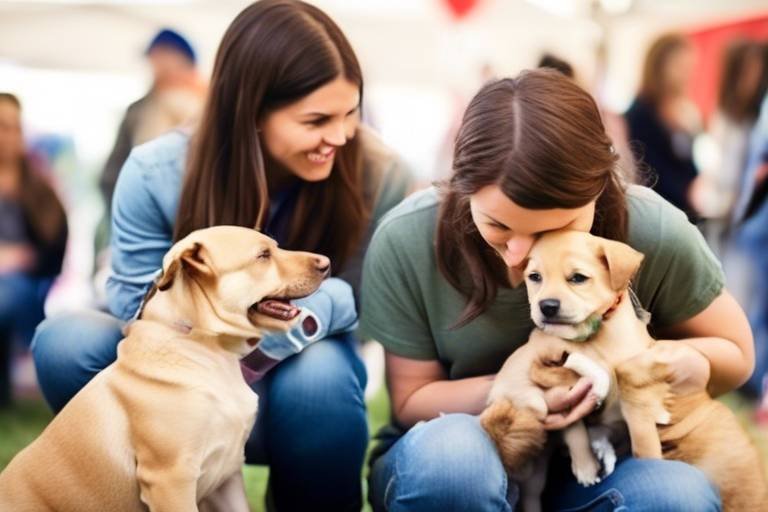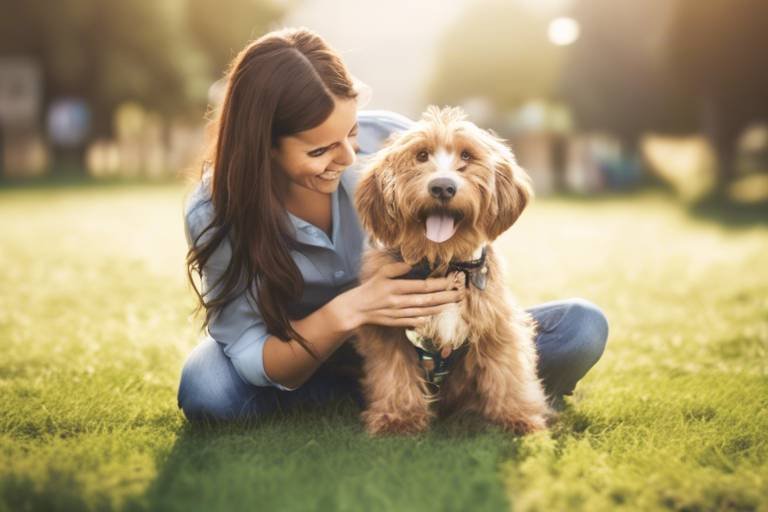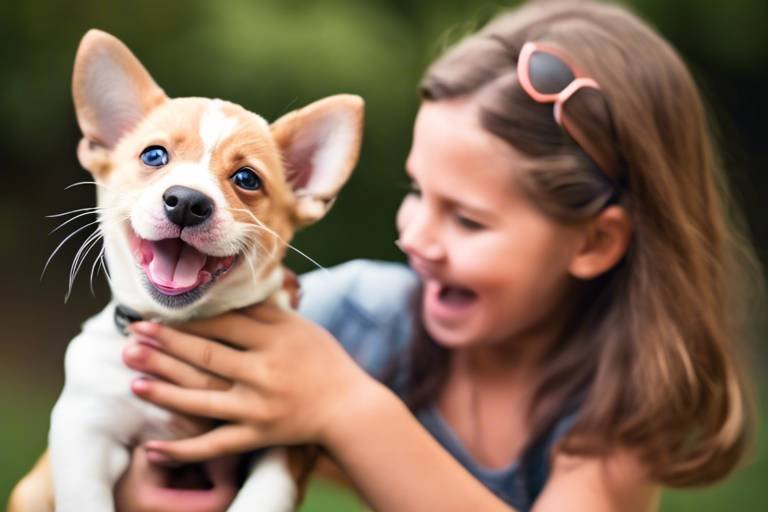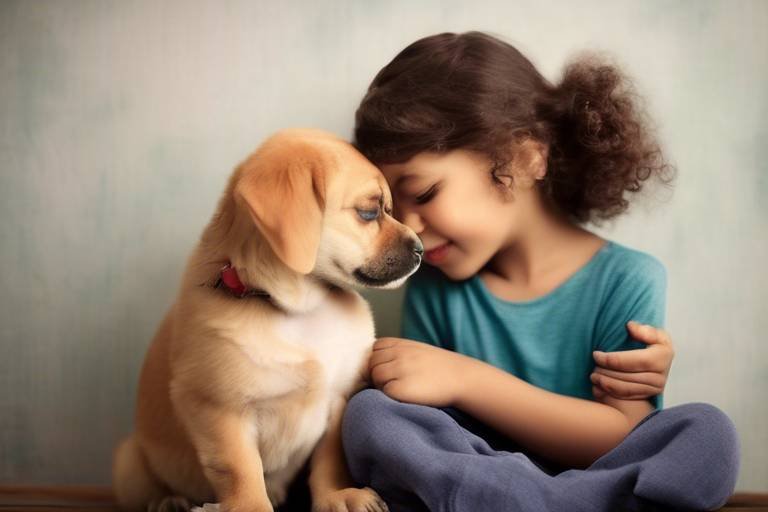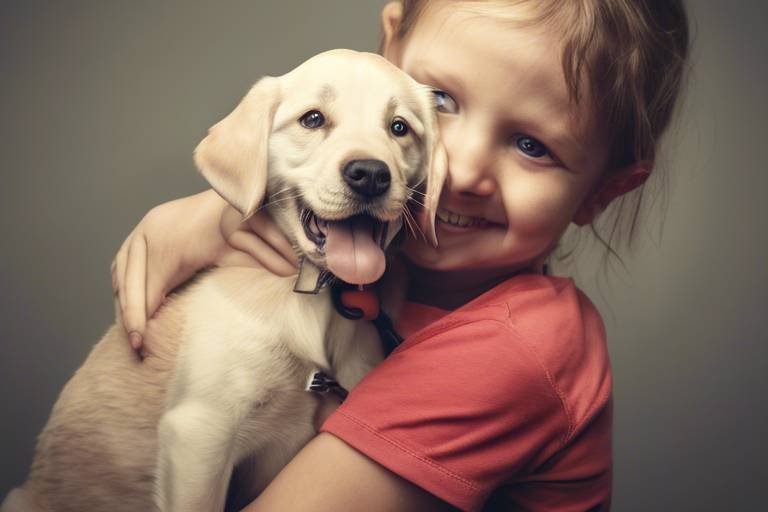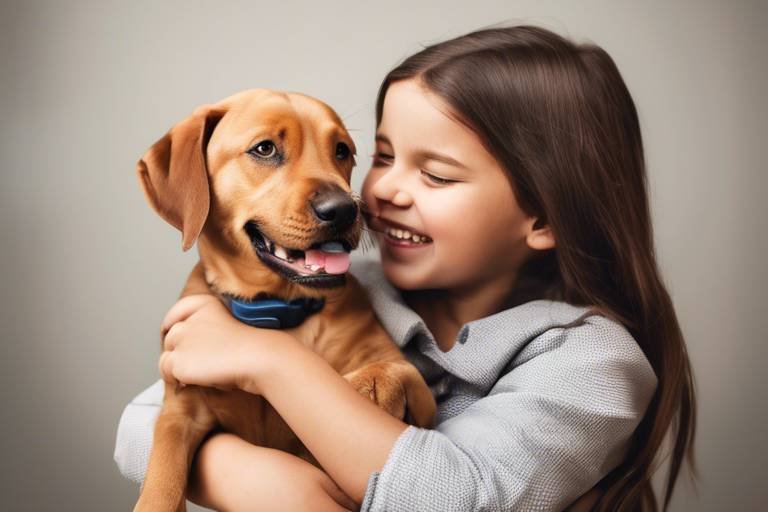The Role of Adoption Counseling in Successful Pet Placement
In today's world, where countless pets are in need of loving homes, the importance of adoption counseling cannot be overstated. It serves as a bridge connecting potential pet owners with their future companions, ensuring that both parties are well-prepared for the journey ahead. Think of adoption counseling as a personalized matchmaking service, but instead of finding romantic partners, it helps people find their perfect furry friends. The ultimate goal? To create a harmonious relationship that lasts a lifetime and reduces the chances of animals being rehomed.
Adoption counseling does more than just facilitate the adoption process; it lays the groundwork for a successful pet-owner relationship. It equips adopters with the knowledge they need to make informed decisions, thus enhancing the overall experience for both the pet and the owner. Imagine walking into a shelter excited but overwhelmed by the choices. Adoption counselors step in as guides, helping to navigate this emotional landscape with empathy and expertise.
By understanding the specific needs of both the pets and the adopters, these counselors play a crucial role in ensuring that each placement is a successful one. They assess various factors such as lifestyle, preferences, and household dynamics, which are essential for a good match. For example, a high-energy dog might not be suitable for someone who lives a more sedentary lifestyle. Without this careful consideration, the chances of a successful adoption diminish significantly.
Moreover, the role of adoption counseling extends beyond just the initial placement. It includes providing post-adoption support to address any challenges that new pet owners may encounter. This ongoing guidance is vital for fostering a long-lasting relationship between pets and their families. After all, adopting a pet is not just a one-time event; it's a commitment that requires continuous effort and understanding.
In summary, adoption counseling is an essential component of successful pet placement. It not only enhances the experience for adopters and pets but also contributes to the well-being of the community by promoting responsible pet ownership and reducing shelter overcrowding. The impact of effective counseling is profound, as it helps to create loving, stable homes for pets in need.
- What is adoption counseling? Adoption counseling provides guidance to potential pet adopters, ensuring they understand the responsibilities of pet ownership and helping them find the right match.
- How does adoption counseling improve pet retention rates? By assessing compatibility and providing ongoing support, adoption counseling helps ensure that pets are placed in suitable homes, reducing the likelihood of rehoming.
- What kind of support do counselors provide after adoption? Counselors offer training resources and behavior management strategies to help new pet owners navigate common challenges.
- Why is responsible pet ownership emphasized in adoption counseling? Educating adopters on proper care, nutrition, and health needs promotes the well-being of pets and fosters a successful relationship.

Understanding Adoption Counseling
Adoption counseling is a vital component of the pet adoption process, serving as a bridge between potential pet owners and their future furry companions. It goes beyond just filling out an application form or choosing a pet from a shelter; it is about building a connection that ensures both the animal and the adopter are well-suited for each other. Think of it as a matchmaking service, but instead of finding a romantic partner, it aims to create a bond between humans and animals, ensuring that each party's needs and expectations are met.
At its core, adoption counseling provides guidance and support to potential adopters, helping them navigate the responsibilities that come with pet ownership. Many people may not fully understand what it means to care for a pet—it's not just about providing food and shelter. Counselors engage with adopters to discuss various factors, such as the time commitment required, the financial responsibilities, and the emotional investment that comes with welcoming a new pet into their home. By addressing these critical aspects, counselors can help adopters make informed decisions that lead to successful placements.
Moreover, adoption counseling is about fostering a deeper understanding of the individual needs of both the pet and the adopter. For instance, a counselor may conduct a thorough assessment of the adopter's lifestyle, preferences, and household dynamics. This evaluation can include questions about:
- Daily activity levels
- Family members and their interactions with pets
- Living arrangements, such as whether they have a yard or live in an apartment
- Allergies or sensitivities to certain animals
By gathering this information, counselors can recommend pets that not only fit the adopter's lifestyle but also possess temperaments that align with their expectations. This careful matching process significantly reduces the chances of pets being returned to shelters, as it ensures that both parties are prepared for a successful relationship.
In addition to initial counseling, the role of adoption counselors extends into the post-adoption phase. They provide ongoing support and resources that help new pet owners adjust to their roles. This could involve offering advice on training techniques or behavioral management strategies, which can be invaluable for those who may be new to pet ownership. Ultimately, the goal is to create a supportive environment where pets and their families can thrive together.
In summary, understanding adoption counseling is crucial for anyone considering bringing a pet into their home. It is not merely a step in the adoption process; it is a comprehensive approach that aims to match pets with the right families while providing the necessary support to ensure a happy and healthy relationship.

The Benefits of Adoption Counseling
Adoption counseling is more than just a helpful service; it acts as a bridge connecting potential pet owners with their furry companions. One of the most significant benefits of this counseling is the substantial increase in pet retention rates. When adopters are well-informed about the needs and behaviors of their new pets, they are less likely to face challenges that could lead to rehoming. Imagine bringing home a pet only to realize you’re not equipped to handle its energy levels or specific needs—adoption counseling helps prevent these situations.
Additionally, adoption counseling enhances adopter satisfaction. When individuals feel supported and educated about their responsibilities, they are more likely to feel confident and fulfilled in their new role as pet owners. This satisfaction translates into a deeper bond between the pet and the owner, creating a loving environment where both can thrive. It’s like planting a seed in well-nourished soil; with the right care, it grows into a beautiful, flourishing relationship.
Through effective counseling, adopters gain a better understanding of pet behavior and needs. This knowledge is crucial for fostering a successful long-term placement. For instance, if a counselor explains that a particular breed may require more exercise or mental stimulation, the adopter can adjust their lifestyle accordingly. This proactive approach not only benefits the pet but also enriches the adopter's experience, making it more enjoyable and rewarding.
Moreover, adoption counseling can lead to a more informed community. When individuals are educated about responsible pet ownership, they are more likely to share their knowledge with others. This ripple effect can significantly improve the overall welfare of animals in the community, reducing the number of pets that end up in shelters. In essence, the benefits of adoption counseling extend far beyond the individual adopters and pets—it contributes to a healthier, more compassionate society.
In summary, the advantages of adoption counseling are multifaceted, encompassing improved pet retention rates, enhanced satisfaction among adopters, and a deeper understanding of pet needs and behaviors. It’s a vital component in the journey of pet adoption, ensuring that both animals and their new families embark on a path filled with love, understanding, and companionship.
- What is the primary goal of adoption counseling?
The primary goal of adoption counseling is to ensure a successful match between pets and adopters by providing guidance and support throughout the adoption process. - How does adoption counseling improve pet retention rates?
By educating adopters about the specific needs and behaviors of pets, counseling helps them prepare for the responsibilities of pet ownership, reducing the likelihood of rehoming. - What kind of support do counselors provide after adoption?
Counselors often offer post-adoption support, including training resources and behavior management strategies, to help new pet owners navigate any challenges they may face. - Why is understanding pet temperament important?
Understanding pet temperament is crucial for ensuring a good match between the pet and the adopter's lifestyle, leading to a more harmonious relationship.
Matching Pets with Adopters
When it comes to finding the perfect furry companion, the process of is crucial. It's not just about picking a cute face; it's about ensuring that both the pet and the adopter are set up for a successful relationship. Imagine trying to fit a square peg into a round hole—without the right match, both parties could end up feeling frustrated and unhappy. Adoption counselors play a vital role in this process, acting as facilitators who understand the unique needs of both pets and potential owners.
One of the first steps in this matching process is assessing the lifestyle of the prospective adopter. This includes understanding their daily routines, activity levels, and even their living situation. For instance, a busy professional who works long hours may not be suited for a high-energy dog that requires frequent exercise. Instead, a more laid-back pet, such as a senior dog or a cat, might be a better fit. By evaluating these factors, counselors can recommend pets that align with the adopter's lifestyle, ensuring that the new addition to the family is a good match.
Moreover, understanding pet temperament is equally essential. Each animal has its own personality traits, ranging from playful and energetic to calm and reserved. Adoption counselors help potential adopters grasp these differences, guiding them toward pets that match their expectations for companionship. For example, if an adopter is looking for a cuddly lap dog, they wouldn’t want to be matched with a high-strung puppy that’s more interested in running around than snuggling. This personalized approach helps create a harmonious relationship from the get-go.
In addition to personal preferences, counselors also take into account the household dynamics. Do the adopters have children or other pets? Are there any allergies to consider? These are all critical factors that can influence the decision-making process. By conducting thorough interviews and using tools like compatibility questionnaires, counselors can provide tailored recommendations that consider the entire household, ensuring that everyone—including the pet—will feel comfortable and happy.
To further enhance the matching process, many organizations have begun to implement behavior assessments for their animals. These assessments can provide valuable insights into a pet's behavior, helping counselors match them with adopters who can meet their specific needs. For instance, a dog that shows signs of anxiety might thrive in a calm home with an experienced owner who understands how to manage such behaviors. On the other hand, a more social and outgoing pet may do well in a lively household where they can receive plenty of attention and interaction.
Ultimately, the goal of matching pets with adopters is to promote successful, long-term placements. When both parties are well-matched, the chances of rehoming decrease significantly. Successful placements not only enhance the lives of the pets but also enrich the lives of the adopters, creating a bond that can last a lifetime. So, the next time you're considering adopting a pet, remember that it's a two-way street, and the right match can lead to a fulfilling relationship for everyone involved.
Assessing Lifestyle Compatibility
When it comes to adopting a pet, understanding lifestyle compatibility is crucial. Imagine bringing home a high-energy dog when you’re more of a couch potato; it’s like trying to mix oil and water! Adoption counselors play a vital role in this process by diving deep into the potential adopter's daily life, habits, and preferences. They ask the right questions to ensure that the pet they recommend will fit seamlessly into the adopter’s lifestyle.
For instance, the counselor might inquire about the adopter's daily routine, work schedule, and activity levels. Are they out of the house for long hours, or do they work from home? Do they enjoy outdoor activities like hiking and running, or do they prefer a quiet evening at home? By understanding these aspects, counselors can suggest pets that are not just adorable but also compatible with the adopter's way of life.
To illustrate, here are some factors that counselors typically assess:
- Time Commitment: How much time can the adopter dedicate to their new pet? Some breeds require more attention and exercise than others.
- Living Situation: Is the adopter in an apartment or a house with a yard? Larger dogs may need more space to roam.
- Family Dynamics: Are there children or other pets in the household? The counselor will consider how these factors influence the pet’s integration into the family.
After gathering this information, counselors can recommend pets that suit the adopter’s lifestyle. For example, a busy professional might be better matched with a low-energy cat, while an active family might thrive with a playful dog. This thoughtful matching not only enhances the chances of a successful adoption but also reduces the likelihood of the pet being returned to the shelter.
Ultimately, assessing lifestyle compatibility is about creating a harmonious relationship between the pet and the owner. It’s not just about finding a pet; it’s about finding the right pet that can become a cherished member of the family. By taking the time to evaluate these factors, adoption counselors help ensure that both pets and adopters can enjoy a fulfilling and lasting companionship.
Q: What is lifestyle compatibility in pet adoption?
A: Lifestyle compatibility refers to how well a potential pet fits into an adopter's daily life, including their activity levels, work schedule, and family dynamics. Adoption counselors assess these factors to recommend the most suitable pets.
Q: Why is it important to consider lifestyle compatibility?
A: Considering lifestyle compatibility is essential to ensure a successful match between the pet and the adopter. A good fit increases the likelihood of a long-term relationship, reducing the chances of the pet being returned to a shelter.
Q: How can I prepare for my meeting with an adoption counselor?
A: To prepare, think about your daily routine, how much time you can dedicate to a pet, and any specific preferences you have regarding pet size, breed, or temperament. This information will help the counselor make the best recommendations for you.
Understanding Pet Temperament
Understanding a pet's temperament is crucial when it comes to making the right adoption choice. Just like humans, each animal has its own unique personality traits that can significantly influence how they interact with their new family. This is where adoption counselors play a pivotal role. They help potential adopters navigate the often intricate world of pet behavior, ensuring that the chosen pet will fit seamlessly into the adopter's lifestyle and home environment.
When considering a new furry friend, it's essential to recognize that pets exhibit a range of temperamental characteristics. Some pets are naturally affectionate and playful, while others may be more reserved or independent. Adoption counselors can provide insights into these traits, helping adopters understand what to expect from their new companion. For instance, a high-energy dog may not be suitable for someone with a more sedentary lifestyle, just as a shy cat might not thrive in a bustling household with young children.
To further illustrate the diversity of pet temperaments, here’s a quick overview of common personality types you might encounter:
| Temperament Type | Description | Best Fit |
|---|---|---|
| Affectionate | Enjoys cuddling and being around people. | Families, individuals looking for companionship. |
| Playful | Full of energy, loves to play and engage. | Active families, individuals who enjoy outdoor activities. |
| Independent | Likes to do its own thing, less demanding of attention. | Busy individuals, those who prefer lower-maintenance pets. |
| Shy | May take time to warm up to new people and environments. | Calm households, adopters willing to provide patience and space. |
By understanding these temperament types, potential adopters can better assess which pet might be the best match for them. Adoption counselors often conduct personality assessments to guide this process, asking questions about the adopter's lifestyle, preferences, and previous pet ownership experiences. This tailored approach ensures that both the pet and the adopter can enjoy a fulfilling and harmonious relationship.
Moreover, recognizing a pet's temperament helps adopters set realistic expectations. For example, an energetic dog may require regular exercise and mental stimulation, while a more laid-back cat might be content with a cozy spot on the couch. By aligning the pet's needs with the adopter's lifestyle, the likelihood of successful integration into the home increases significantly.
In conclusion, understanding pet temperament is not just a matter of matching preferences; it's about creating a lasting bond that benefits both the pet and the owner. With the guidance of adoption counselors, prospective adopters can make informed decisions that lead to successful, long-term placements, ultimately enriching both their lives and the lives of their new furry companions.
- What is pet temperament? Pet temperament refers to the inherent personality traits and behaviors that an animal exhibits, influencing how they interact with people and their environment.
- Why is understanding temperament important for adopters? Understanding a pet's temperament helps adopters choose a pet that fits their lifestyle, reducing the chances of rehoming and ensuring a happy relationship.
- How can adoption counselors assist in assessing temperament? Adoption counselors can provide insights into a pet's behavior, recommend suitable matches, and help adopters understand what to expect from their new companion.
Providing Post-Adoption Support
When a family decides to adopt a pet, the excitement is palpable. However, the journey doesn’t end once the adoption paperwork is signed; in fact, it’s just the beginning! is essential to ensure that both the pet and the new owner can navigate the challenges of their new life together. Just like how a new parent receives guidance after bringing a baby home, pet adopters benefit immensely from ongoing support.
One of the key aspects of post-adoption support is the availability of resources that help new pet owners address common issues. For instance, many adopters may encounter unexpected behavioral problems or health issues that can arise shortly after bringing their furry friend home. Having access to a network of experts, including veterinarians and animal behaviorists, can make a world of difference. This support system can help adopters feel more confident in their ability to care for their new companion.
Additionally, many adoption agencies offer follow-up consultations to check in on how the pet is adjusting to their new environment. These consultations can be incredibly beneficial, as they provide an opportunity for adopters to ask questions and receive tailored advice. Whether it’s about house training, managing separation anxiety, or introducing the pet to other family members, these sessions can help prevent misunderstandings and foster a stronger bond between the pet and the owner.
Moreover, support doesn't just stop at advice. Some organizations provide training classes that adopters can attend with their pets. These classes not only teach essential commands and tricks but also help strengthen the human-animal bond through positive reinforcement techniques. By participating in training together, pets and their owners can learn to communicate better and understand each other’s needs, leading to a more harmonious household.
In addition, many adoption agencies create community networks where pet owners can connect with each other. This is where the magic really happens! When you have a support group of fellow pet owners, sharing experiences, tips, and even venting about the challenges can be incredibly therapeutic. It’s like having a group of friends who totally get what you’re going through. These connections can lead to playdates, group training sessions, and a sense of belonging that enhances the overall pet ownership experience.
To summarize, post-adoption support is a vital component of the adoption process. By providing resources, follow-up consultations, training opportunities, and community connections, adoption counselors play a crucial role in ensuring that both pets and their new families thrive together. After all, adopting a pet is not just about finding them a home; it’s about creating a lasting partnership that brings joy and fulfillment to both parties.
- What is post-adoption support? Post-adoption support includes resources, consultations, and training opportunities provided to new pet owners to help them adjust to their new responsibilities.
- Why is post-adoption support important? It helps address common challenges, enhances the bond between pets and owners, and promotes responsible pet ownership.
- How can I access post-adoption support? Many adoption agencies offer follow-up consultations, training classes, and community networks for new adopters.
- What types of issues can post-adoption support help with? It can assist with behavioral problems, health concerns, training, and general pet care advice.

Training and Behavior Guidance
When it comes to welcoming a new furry friend into your home, training and behavior guidance are essential components that can make or break the experience. Imagine trying to teach a toddler how to tie their shoes without any guidance; it would be a frustrating endeavor, right? Similarly, pets require direction to thrive in their new environments. Adoption counselors play a vital role in equipping new pet owners with the tools and knowledge they need to foster a positive relationship with their pets.
One of the first steps in this process is understanding that each pet is unique, with its own personality and behavioral quirks. Adoption counselors often provide resources that help new owners recognize and interpret their pet's behavior. This includes understanding body language, vocalizations, and even subtle cues that indicate how a pet is feeling. For instance, a wagging tail might suggest excitement, but it can also indicate nervousness in certain contexts. By learning these nuances, adopters can respond appropriately and create a supportive environment for their pets.
In addition to behavioral understanding, counselors often introduce training techniques that are both effective and humane. Positive reinforcement is a popular method where pets are rewarded for desired behaviors, making learning a fun and engaging process. This approach not only helps with basic commands but also strengthens the bond between the pet and the owner. Think of it as a partnership where both parties work together towards a common goal. The beauty of this method lies in its ability to build trust and respect, creating a harmonious household.
Moreover, counselors may offer tailored training plans based on the specific needs of both the pet and the adopter. For example, a high-energy dog may require more exercise and mental stimulation than a laid-back cat. By assessing the individual circumstances, counselors can recommend activities that suit the pet’s energy levels and the owner’s lifestyle. This personalized approach increases the likelihood of a successful transition and helps prevent behavioral issues that could lead to rehoming.
In some cases, adoption counselors also provide ongoing support after the adoption process. This can include follow-up sessions, workshops, or even access to online resources. Such support can be invaluable, especially during the initial adjustment period. Adopters may encounter challenges like separation anxiety, house training, or socialization issues. Having a knowledgeable resource to turn to can alleviate stress and provide practical solutions. Here’s a quick breakdown of common training challenges and suggested solutions:
| Challenge | Suggested Solution |
|---|---|
| Separation Anxiety | Gradual desensitization to alone time, providing engaging toys. |
| House Training | Consistent schedule, positive reinforcement for outdoor bathroom breaks. |
| Excessive Barking | Identifying triggers, teaching the "quiet" command with rewards. |
Ultimately, the goal of training and behavior guidance through adoption counseling is to promote responsible pet ownership. This means not only ensuring pets are well-trained but also that their emotional and physical needs are met. A well-adjusted pet is a happy pet, and a happy pet leads to a happy home. By investing time in training and understanding behavior, adopters can create a lasting bond with their new companions, paving the way for a fulfilling relationship.
- What is the best way to train my new pet? Positive reinforcement is highly effective. Reward desired behaviors with treats or praise.
- How long does it take to train a pet? Training duration varies by pet and the complexity of the commands but consistency is key!
- What should I do if my pet shows signs of anxiety? Consult with your adoption counselor for tailored strategies to help your pet adjust.
- Can I train my pet on my own? Yes, many resources are available, but having guidance from a counselor can enhance the experience.
Promoting Responsible Pet Ownership
When it comes to welcoming a furry friend into your home, understanding the responsibilities that come with pet ownership is absolutely crucial. Adoption counseling plays a pivotal role in promoting responsible pet ownership by educating potential adopters on the various aspects of caring for their new companions. This process begins with a clear discussion about the pet's needs, which can vary significantly from one species to another and even among individual animals. For instance, did you know that certain dog breeds require more exercise than others? Or that some cats thrive on interactive play while others prefer a cozy spot by the window? By addressing these nuances, counselors help ensure that adopters are fully prepared for the journey ahead.
Moreover, responsible pet ownership isn't just about meeting basic needs; it encompasses a holistic approach to animal care. This includes understanding proper nutrition, regular veterinary visits, grooming, and socialization. For instance, providing a balanced diet tailored to your pet's age, size, and health condition is vital. It’s like fueling a high-performance car; you wouldn’t put just any gas in it, would you? Similarly, your pet deserves the best possible food to thrive. Counselors often share resources and tips on selecting the right food and understanding portion sizes, which can prevent obesity and related health issues.
Additionally, adoption counseling emphasizes the significance of regular veterinary care. Just like we visit the doctor for check-ups, pets need their own healthcare routine. This includes vaccinations, dental care, and preventive treatments for fleas and ticks. A well-informed owner will recognize the importance of these visits and ensure their pet remains healthy and happy. To illustrate this, consider the following table that outlines common veterinary care components:
| Veterinary Care Component | Frequency | Purpose |
|---|---|---|
| Annual Check-up | Once a year | General health assessment and vaccinations |
| Dental Cleaning | Every 1-2 years | Prevent dental diseases |
| Flea/Tick Prevention | Monthly | Prevent infestations and diseases |
Another essential aspect of responsible pet ownership is understanding behavioral needs. Pets, like humans, have their own personalities and temperaments. A dog might need daily walks and playtime, while a cat may require opportunities for climbing and exploring. Adoption counselors often provide insights into these behavioral needs, encouraging owners to engage in activities that stimulate their pets mentally and physically. This not only enhances the bond between pet and owner but also helps prevent behavioral issues that can arise from boredom or lack of exercise.
Furthermore, responsible pet ownership extends to the community level. By educating adopters about the importance of spaying and neutering, counselors help reduce the number of unwanted animals in shelters. This proactive approach not only benefits individual pets but also contributes to the broader goal of animal welfare. When more pets are spayed or neutered, there are fewer strays on the streets, leading to a healthier community overall.
In conclusion, promoting responsible pet ownership through adoption counseling is a multifaceted approach that benefits everyone involved—pets, owners, and the community at large. By ensuring that new pet owners are well-informed and prepared, we can create a world where every pet is cherished and cared for. After all, adopting a pet is not just about bringing a new friend into your life; it’s about making a commitment to love and care for them for their entire lives.
- What should I consider before adopting a pet? It's essential to evaluate your lifestyle, time commitment, and financial readiness for pet ownership.
- How can I prepare my home for a new pet? Ensure your home is safe and welcoming, removing hazards and creating a designated space for your pet.
- What are the benefits of spaying or neutering my pet? Spaying and neutering help control the pet population and can reduce certain health risks.
- How can I address behavioral issues in my new pet? Seek guidance from your adoption counselor or a professional trainer to understand and manage these behaviors effectively.

Community Impact of Adoption Counseling
Adoption counseling plays a pivotal role in shaping not just the lives of pets and their new owners, but also the fabric of our communities. When we think about the impact of adopting a pet, it's easy to focus on the joy it brings to individual families. However, the ripple effects of successful pet placements extend far beyond the home. By facilitating better matches between pets and adopters, adoption counseling reduces the number of animals returned to shelters, ultimately leading to lower euthanasia rates and improved animal welfare in the community.
Moreover, when adoption counseling is effectively implemented, it encourages responsible pet ownership. This means that new pet owners are not only aware of their responsibilities but are also equipped with the necessary tools and knowledge to care for their pets. This can lead to a more informed community where pet owners understand the importance of regular veterinary visits, proper nutrition, and socialization for their furry friends. As a result, the overall health and happiness of pets in the community improve, which can be seen in the reduction of stray animals and the increase in well-cared-for pets.
Another significant community impact is the promotion of volunteerism and support for local shelters. When individuals engage in adoption counseling, they often become more invested in their local animal welfare organizations. This can lead to increased volunteer efforts, donations, and support for various initiatives aimed at improving the lives of animals in need. As these organizations flourish with community backing, they can expand their outreach programs, educational efforts, and resources to help even more animals find loving homes.
To illustrate the impact of adoption counseling on community welfare, consider the following table that summarizes key benefits:
| Benefit | Description |
|---|---|
| Reduced Shelter Overcrowding | Effective counseling leads to better matches, decreasing the number of pets returned to shelters. |
| Increased Community Awareness | Educated adopters share knowledge, promoting responsible pet ownership in the community. |
| Enhanced Animal Welfare | Better care leads to healthier pets, reducing the number of strays and improving overall animal health. |
| Support for Local Shelters | Engagement in adoption counseling fosters community support for shelters through volunteering and donations. |
In conclusion, the impact of adoption counseling reaches far beyond the immediate relationship between pets and their owners. It fosters a culture of responsibility, compassion, and community engagement, ultimately leading to a more humane society for all animals. As we continue to advocate for the importance of adoption counseling, we can envision a future where every pet finds a loving home, and communities thrive in their shared commitment to animal welfare.
- What is adoption counseling? Adoption counseling is a process that helps potential pet adopters understand their responsibilities and find the right match between themselves and a pet.
- How does adoption counseling benefit pets? It improves the chances of successful placements, reduces the likelihood of pets being returned to shelters, and enhances their overall well-being.
- Can adoption counseling help with post-adoption issues? Yes, counselors provide support and resources to help new pet owners navigate challenges and ensure a smooth transition for their pets.
- How can I get involved with adoption counseling? You can volunteer at local shelters or organizations that offer adoption counseling services, helping to educate others about responsible pet ownership.
Frequently Asked Questions
- What is adoption counseling?
Adoption counseling is a process that helps potential pet adopters understand the responsibilities of pet ownership. It ensures that there is a good match between the pet and the owner, enhancing the likelihood of a successful placement.
- How does adoption counseling improve pet retention rates?
By providing personalized guidance and support, adoption counseling helps adopters choose pets that fit their lifestyles and preferences. This compatibility leads to happier homes and reduces the chances of pets being returned to shelters.
- What factors are considered when matching pets with adopters?
Counselors assess various factors, including the adopter's lifestyle, activity levels, household dynamics, and preferences. This thorough evaluation helps ensure that both the pet and the adopter are well-suited for each other.
- Can adoption counseling help with post-adoption challenges?
Absolutely! Adoption counseling provides ongoing support to new pet owners, helping them navigate common challenges and fostering a strong, lasting relationship between pets and their families.
- What kind of training resources do counselors provide?
Counselors often offer training resources and behavior management strategies tailored to the specific needs of the pet and the adopter. This guidance is essential for a smooth transition and helps address potential behavioral issues.
- Why is responsible pet ownership emphasized in adoption counseling?
Responsible pet ownership is crucial for the well-being of pets. Adoption counseling educates adopters on proper care, nutrition, and health needs, ensuring that they can provide a loving and supportive environment for their new companions.
- How does adoption counseling impact the community?
Effective adoption counseling not only benefits individual pets and families but also contributes to the broader community by reducing shelter overcrowding and promoting animal welfare initiatives. This positive impact helps create a healthier environment for all animals.


